How to Succeed in Business Without Really Trying Blu-ray Movie
HomeHow to Succeed in Business Without Really Trying Blu-ray Movie 
Limited Edition to 3000Twilight Time | 1967 | 121 min | Not rated | Mar 14, 2017
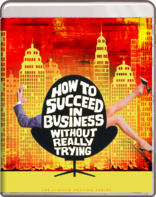
Price
Movie rating
7.2 | / 10 |
Blu-ray rating
| Users | 4.0 | |
| Reviewer | 3.5 | |
| Overall | 3.5 |
Overview
How to Succeed in Business Without Really Trying (1967)
Big business means big laughs as Robert Morse schemes and scams his way to the top in this bold and bawdy musical that celebrates the Great American Corporate Way — and lampoons it at the same time. With musical supervision by the legendary Nelson Riddle, this tune-filled comic gem is a goldmine of great Frank Loesser songs including "I Believe in You," "Rosemary," and "The Company Way." Written, produced and directed by David Swift, and based on the Pulitzer Prize-winning Broadway hit, this classic musical is "bristling with humor, romance and song" (The Hollywood Reporter)! The story charts the meteoric rise of an ambitious window washer who, with the help of a simple guidebook, gets the job, gets the girl, gets the raise and gets the attention of the Big Boss himself — all by his second day at work! Now it's only a matter of hours before he goes from zero to CEO!
Starring: Robert Morse (I), Michele Lee (I), Rudy Vallée, Anthony 'Scooter' Teague, Maureen ArthurDirector: David Swift (II)
| Musical | 100% |
| Comedy | Insignificant |
Specifications
Video
Video codec: MPEG-4 AVC
Video resolution: 1080p
Aspect ratio: 2.34:1
Original aspect ratio: 2.35:1
Audio
English: DTS-HD Master Audio 5.1 (48kHz, 24-bit)
English: DTS-HD Master Audio 2.0 (48kHz, 24-bit)
Music: DTS-HD Master Audio 2.0 (48kHz, 24-bit)
Subtitles
English SDH
Discs
Blu-ray Disc
Single disc (1 BD)
Playback
Region free
Review
Rating summary
| Movie | 3.5 | |
| Video | 3.5 | |
| Audio | 4.0 | |
| Extras | 2.0 | |
| Overall | 3.5 |
How to Succeed in Business Without Really Trying Blu-ray Movie Review
Will this Blu-ray be all that you need?
Reviewed by Jeffrey Kauffman March 25, 2017Genres experience peaks and valleys in popularity in the film industry, as is probably unavoidable, but has there ever been a more dramatic (maybe even precipitous) fall from grace than that which the American film musical experienced over the course of just a couple of years in the mid- to the late sixties? Even those who couldn’t care less about characters suddenly breaking into song at moments of emotional intensity could probably detail plot points (and maybe even some of the songs) of at least two iconic musicals culled from hit Broadway musicals that became iconic (and incredibly successful) films in their own right, West Side Story from 1961 and The Sound of Music from 1965 (both films probably not so coincidentally directed by Robert Wise). The years between these cinematic “bookends” typically had at least one major film musical based on a Broadway spectacular appear, with 1962 seeing the film versions of Gypsy and The Music Man, 1963 ushering in Bye Bye Birdie and 1964 offering My Fair Lady. One could have reasonably come to the conclusion that with a track record like that, especially one ending with The Sound of Music, one of the biggest box office champs of its era, that the film musical was on solid footing and had a rosy future. There were nevertheless some warning signs on the horizon, though, as evidenced by the difficulties the Oscars had filling the often variously named category that feted “adaptation scores” even during some of these halcyon years, but when musicals made a connection with the filmgoing audience, they tended to do so in a very big way. But look at what happened in the wake of The Sound of Music’s astounding box office returns. 1966 (when The Sound of Music was still raking in piles of cash) was a virtual nadir of musical film offerings, with the Oscar for Adaptation Score going to Ken Thorne for his work on A Funny Thing Happened on the Way to the Forum (a film notably shorn of much of its Broadway version’s score) simply because there wasn’t that much competition (which is not to say Thorne’s efforts weren’t very enjoyable). 1967 seemed to offer more than 1966 did, with Camelot raising Warner Brothers’ hopes that it could recreate the magic of Warner’s previous Lerner and Loewe adaptation, My Fair Lady (hint: it didn’t). 1967 also saw the hugely hyped original musical Doctor Dolittle, but the film was just one of many that came close to sinking 20th Century Fox. Almost unnoticed in this transition phase between regular film musical hits and some pretty slim pickings as the sixties gave way to the seventies was a film based on one of the relatively few musicals to win a Pulitzer Prize, How to Succeed in Business Without Really Trying.
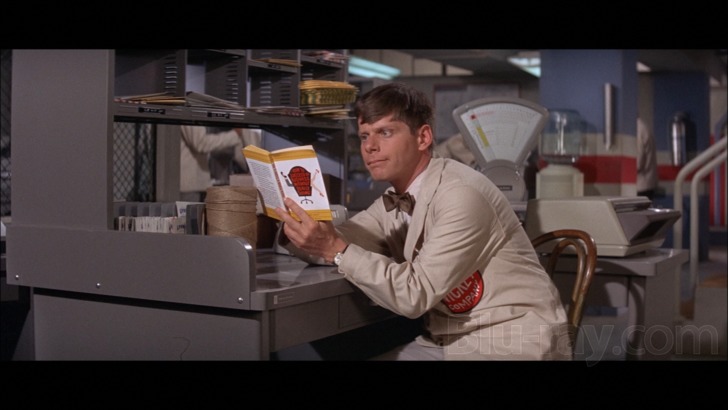
How to Succeed in Business Without Really Trying begins with window washer J. Pierrepont Finch (Robert Morse) picking up a book called, well, How to Succeed in Business Without Really Trying, a tome which actually did exist, coming out in 1952 and storming to the top of the best seller list kind of like a mailroom employee bursting into the executive suite (that’s a bit of foreshadowing, for those who care). The film’s screenplay (by director David Swift) hews fairly closely to the original musical book, positing a “book narrator” who gives Finch advice on getting ahead in the business world. In one of the film’s kind of whimsical updates of the stage version, Finch actually just opens a window in a New York skyscraper where he’s working (i.e., outside, washing windows), hoists himself inside and rather quickly matriculates into the wacky environment of the World Wide Wicket Company where he almost instantly literally bumps into company president J.B. Biggley (Rudy Vallee, like Morse recreating his Broadway role).
Finch also quickly meets pretty secretary Rosemary Pilkington (Michele Lee, who took over the role of Rosemary on Broadway about a year into the show's run), and it’s not hard to see where the romantic angle of the story is going to go. How to Succeed in Business Without Really Trying often plays somewhat like a live action cartoon, with outsized characters doing outlandish things, and with the cast filled with types rather than fleshed out characters. Among these are the lackluster nephew of Biggley, Bud Frump (Anthony Teague), and Biggley’s voluptuous mistress Hedy LaRue (Maureen Arthur), as well as a coterie of “middle managers” who are like the comedic counterparts to some of the supporting staff in various episodes of Mad Men: The Complete Collection (which of course probably not so coincidentally featured Robert Morse).
The story continues to be rather episodic, with Finch learning the corporate ways and various other characters having often shtick laden interchanges. As with 1966’s United Artists musical A Funny Thing Happened on the Way to the Forum (evidently UA had a thing for musicals with insanely long titles during this era), How to Succeed in Business Without Really Trying has had several of its Frank Loesser songs deleted for the film version, including kind of oddly one of Rosemary's big numbers, “Happy to Keep His Dinner Warm”. That very title may be an indication to what a cultural throwback How to Succeed is (though it's a Loesser lyric, which means an almost inescapable irony attends the sentiment), a throwback that also includes song titles like “A Secretary is Not a Toy”, which is perhaps at least a bit of an improvement over Forum’s patently sexist “Everybody Ought to Have a Maid”. (For those not familiar with How to Succeed, but who have perhaps heard the standard it introduced, “I Believe in You”, that song is not in fact a straightforward love song, it’s an anthem to narcissism.)
While this isn’t a horrible adaptation by any stretch, it’s easy to see why it really didn’t catch fire when it first came out. The stage version allowed Morse free rein to play up his tendency to mug, something that perhaps doesn’t play quite as well for a film version. The original staging conceit of having supporting players suddenly doing “the mannequin” while whoever is in the figurative spotlight continues to comment or sing also doesn’t quite work here. Interestingly, Bob Fosse did all the choreography for the original stage version and I wondered as I watched the film again in preparation for this review how things might have been different had Fosse been selected to helm the screen version for his directorial debut, instead of 1969’s (to my mind) sadly underrated Sweet Charity (a film which is way past due on domestic Blu-ray). Fosse may have been able to reinvigorate what was already in 1967 feeling like slightly dated material. Swift was a perfectly competent journeyman director with some huge Disney hits to his credit (Pollyanna, The Parent Trap), as well as one of my personal favorite Jack Lemmon comedies (Good Neighbor Sam), but there’s a certain spark missing from this film which ironically makes it feel like it’s trying way too hard to succeed.
How to Succeed in Business Without Really Trying Blu-ray Movie, Video Quality 
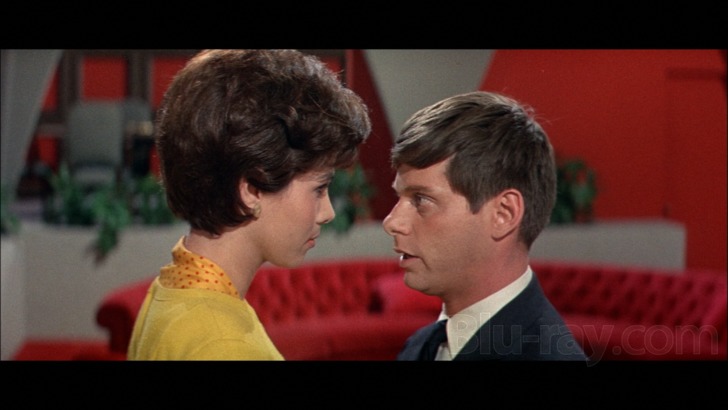
How to Succeed in Business Without Really Trying is presented on Blu-ray with an AVC encoded 1080p transfer in 2.34:1. Those used to the efforts coming out of MGM/UA will know pretty much what to expect here, which is a perfectly watchable if arguably improvable presentation. This is really one of the more colorful musical outings of its era, one which delights in a certain midcentury modern design aesthetic, and while the palette still has bursts of energy (see that great purple sweater Rudy Vallee is wearing in screenshot 3), things look just slightly faded, preventing some tones from really resonating accurately and skewing flesh tones toward brown (a tendency that also tends to push reds toward the orange side of things). Detail and sharpness levels are generally fine, even if there are occasionally what look like actual focus issues. Grain looks natural and encounters no compression issues.
How to Succeed in Business Without Really Trying Blu-ray Movie, Audio Quality 
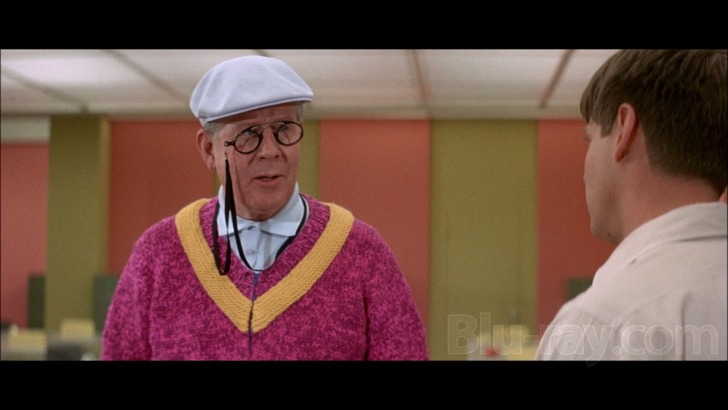
How to Succeed in Business Without Really Trying features lossless DTS-HD Master Audio 5.1 and 2.0 mono tracks. One of the undeniable pleasures of the film version is the wonderful orchestration work by Nelson Riddle (weirdly passed over for an Oscar nomination here, even though he was one of those arguable ballot box "stuffers" filling out the 1964 nominations for Adaptation Score for Robin and the 7 Hoods), who adds a brassy propulsiveness to several tunes that maintains nice breathing room and excellent clarity in the surround version. Aside from the score and a few ambient environmental effects (including some cacophonous crowd noises in various office environments), the 2.0 track is perhaps surprisingly not that different from the surround track. There's some negligible and quickly passing distortion during the opening "How to Succeed" number on Morse's vocals, but otherwise both tracks offer excellent fidelity.
How to Succeed in Business Without Really Trying Blu-ray Movie, Special Features and Extras 
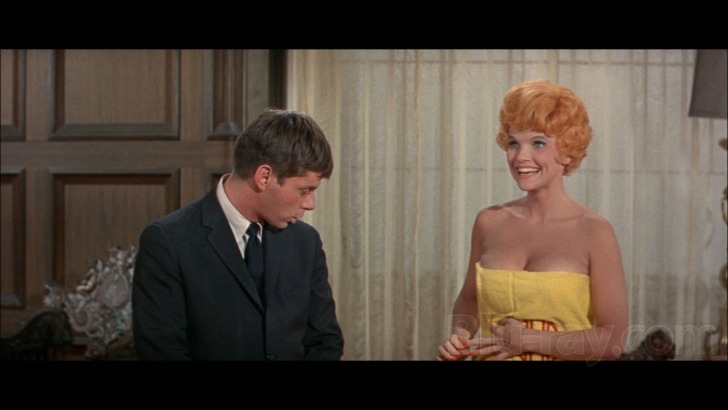
- This Book is all That You Need: Robert Morse on J. Pierrepont Finch (1080p; 19:00) is a really fun reminiscence by Morse, who talks about getting into acting and his subsequent career.
- A Secretary is Not a Toy: Michele Lee on Rosemary Pilkington (1080p; 16:21) is another fun interview, with Lee linking the musical to her memories of the Kennedy Era.
- Original Theatrical Trailer (480p; 2:56)
- Isolated Score Track contains some effects and is presented in DTS-HD Master Audio 2.0.
How to Succeed in Business Without Really Trying Blu-ray Movie, Overall Score and Recommendation 
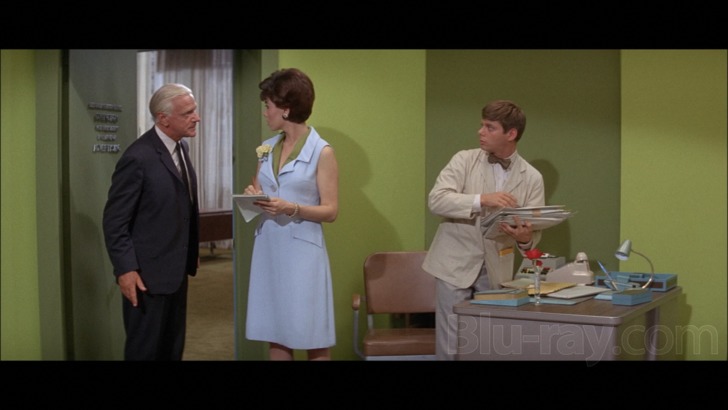
As Michele Lee alludes to in her interview included on this Blu-ray as a supplement, How to Succeed in Business Without Really Trying is really a product of and reflective of its era, and so it may seem incredibly dated to jaded (younger?) viewers. That said, while it's lacking a certain spark which could have tipped it over into truly magical territory, it's one of the more faithful Broadway transferrals of this time period, and it's especially notable (no pun intended) that the film preserves the performances of two of its original Broadway stars. Recommended.
Similar titles
Similar titles you might also like

Bye Bye Birdie
1963

Hair
1979

Finian's Rainbow
Warner Archive Collection
1968

The Opposite Sex
Warner Archive Collection
1956

Hamilton
2020

Reefer Madness: The Movie Musical
2005

Thoroughly Modern Millie
1967

Copacabana
1947

The Unsinkable Molly Brown
Warner Archive Collection
1964

Les Girls
Warner Archive Collection
1957

Godspell
1973

Fame
1980

Clambake
1967

History of the World: Part I
1981

Flower Drum Song
1961

The Girl Can't Help It
1956

Cry-Baby 4K
Director's Cut on BD
1990

Hello, Dolly!
Fox Studio Classics
1969

The Court Jester
Paramount Presents #13
1955

Evita
15th Anniversary Edition
1996